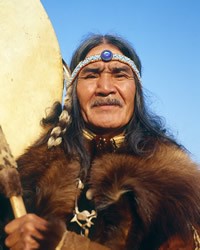Itelmen in Russia

Photo Source:
Anonymous
|
Send Joshua Project a map of this people group.
|
| People Name: | Itelmen |
| Country: | Russia |
| 10/40 Window: | No |
| Population: | 2,600 |
| World Population: | 2,600 |
| Primary Language: | Russian |
| Primary Religion: | Ethnic Religions |
| Christian Adherents: | 5.00 % |
| Evangelicals: | 0.94 % |
| Scripture: | Complete Bible |
| Ministry Resources: | Yes |
| Jesus Film: | Yes |
| Audio Recordings: | Yes |
| People Cluster: | Ural-Siberian |
| Affinity Bloc: | Turkic Peoples |
| Progress Level: |
|
Introduction / History
Itelmen are one of the smallest people groups in the north as well as being one of the most ancient. "Itelmen" means "an inhabitant of dry land, a human being." The name was used for the first time by Russian researchers Kamchatka Steller G. and Krasheninikov around the late 1730s. They also are known as Kamchadals, because they live in Kamchatka. The origin of the Itelmens is unknown, but what we do know is that they are native inhabitants of Kamchatka. Some people say that they moved there thousands of years ago from mainland Asia. In 1697, the Itelmens population was 12,680 people but it dropped to below 9,000 people in 1738 because of contagious sicknesses (pox, etc.).
The Itelmen language is unlike anything else; it belongs to the Chukchi-Kamchatka group of Paloe-Asiatic languages. Native speakers are diminishing; for example, in 1979 about 350 people were recorded as speaking Itelmen, which is the same number as in 1959. During the Soviet period, the Itelmens received their written language. A unified alphabet was created for the Nordic peoples in 1930 which consisted of 28 characters based on the Latin alphabet. An Itelmen alphabet was created in Khabarovsk consisting 27 characters.
Where Are they Located?
The Itelmen do not have their own district because of their small population; however, they live mostly in between Sedanka and Sopochnoye on the western coast of the Kamchatka Peninsula. The climate is monsoon, with the average temperature in January being -11°C and in July +12°C. In the 1950s, they were gathered into larger villages because collective farms were increasing.
What Are Their Lives Like?
The Itelmen are typically river fishers and fur hunters, with everything else, such as hunting, secondary. They would store different wild grasses and roots for food and medicine. Along with storing things, they would make nets, weaving mats and several other things for housekeeping. They also began following the example of the Russians and started using iron tools, fishing nets, new utensils, and clothes. The Itelmen would settle on a river near their relatives with common fishing territories. All one family would live in a half-dugout. Most of the names of their forts would come from the rivers' names where they were built. Their leader was called the fort elder. All the decisions about life around the fort, all the activities, and their celebrations were all discussed in the fort elders' home. Slowly they started to accept the presence of Russians in their cities; eventually they started having mixed marriages which then created the group of Kamchadals.
What Are Their Beliefs?
One of their religious beliefs is fetishism: Men and women wear amulets in the form of idols. They also practice shamanism and want to understand everything including the natural phenomenon and the spirits who live around them. When they honored those spirits, it was directly connected to assuming this would impact their material prosperity. They worshiped the spirit of the sea that gave man fish. They would hold celebrations of "purification" in November for the spirit of the sea. They also worshiped fire, which was presented as a shrine. They believed the world is eternal and souls are immortal. An ancestor, the creator of the nation, was believed to be Raven (Kutkha). All of their beliefs and signs had their own vital role. For example, you wouldn't disassemble old houses and booths in the spring because there were many "Yukol moths." It was also absolutely forbidden to save drowning people or people who got stuck in an avalanche because they were afraid of the spirits.
Prayer Points
Pray that He will share His heart with the "inhabitant of dry land" by sending workers who will go to this harsh, isolated harvest field.
Ask Him to break through the veil of darkness and despair that rests over the Itelman with the saving light of His gospel.
Pray for God to give them dreams of a better life with Christ.
Pray for today's missionaries to approach the Itelman with gentleness and respect, bringing the gospel of Jesus.